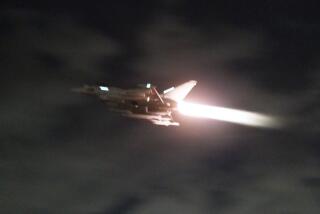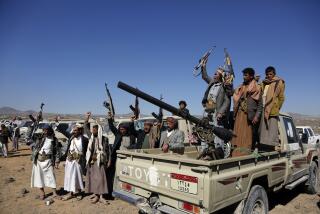GULF WATCH: Day 123 : A daily briefing paper on developments in the crisis : Diplomatic Front:
- Share via
Secretary of State James A. Baker III and Secretary of Defense Dick Cheney gave the bleakest assessment to date of the effect of economic sanctions on Iraq. Baker suggested that sanctions may never work.
Remarks made by Baker, Cheney and National Security Adviser Brent Scowcroft in a series of TV appearances suggested that the Bush Administration now believes it must resolve the Persian Gulf crisis over the next few months, rather than trying to maintain the international embargo over a longer period.
Meanwhile, the five permanent members of the U.N. Security Council will meet in mid-December, “probably in Europe,” to discuss measures being taken against Iraq, French Foreign Minister Roland Dumas said.
Military Front:
Iraq launched surface-to-surface missiles within Iraq in what appeared to be test firings. Defense Secretary Dick Cheney said they apparently were Scud missiles that have a range of up to 400 miles and “could conceivably carry chemical weapons.”
Iraq also warned the Soviet Union not to send troops to the gulf, saying that if it did so, the nation would lose its influence in the Arab world.
U.S. Marines, meanwhile, began a four-day amphibious exercise in the gulf, military officials said.
The Political Front:
Peace activists tried to stop 230 Marine Corps reservists from flying to North Carolina for training by clamping a bicycle lock on a gate at a Chicago-area Marine Corps reserve center. But fire officials cut the lock in time for the reservists to make their 5 a.m. flight.
Sen. Edward M. Kennedy (D-Mass.), meanwhile, said he believes that Congress would reject a resolution of war if it met in special session.
Arab Nation Troop Deployments:
Saudi Arabia: 117,700
United Arab Emirates: 43,000
Oman: 25,500
Egypt: 17,000+
Morocco: 5,000
Syria: 4,000
Bahrain: 3,350
More to Read
Sign up for Essential California
The most important California stories and recommendations in your inbox every morning.
You may occasionally receive promotional content from the Los Angeles Times.












